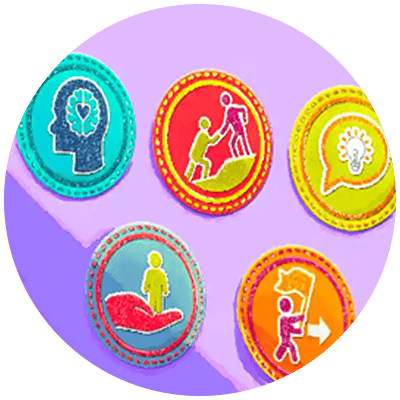As 2024 comes to a close, leadership remains more dynamic and essential than ever. This year challenged organizations to rethink how they inspire, empower, and support their people. Leaders faced new hurdles with innovation and resilience, navigating everything from hybrid work to the growing need for inclusivity and emotional intelligence.
Throughout the year, we explored a wide range of topics to help leaders thrive in this evolving landscape. From shaping culture to addressing the nuances of remote work, these articles offer actionable insights to meet today’s challenges and seize tomorrow’s opportunities. Let’s get to it: here are our top leadership articles of 2024.

1. How Leadership Influences Organizational Culture
Leadership culture shapes organizational culture by promoting transparency, accountability, and inclusivity while also prioritizing skill development, mentoring, and driving the organization toward its goals. Ultimately, strong leadership culture isn’t just beneficial internally—it shapes customer interactions and strengthens your brand. Get the scoop on common mistakes companies make when trying to build an effective culture, plus five strategies to foster a healthy and high-quality leadership culture.

2. Six Factors of Team Effectiveness
Great teams are the backbone of organizational success, but building them takes more than just assembling talent. With 58% of leaders worldwide now working in hybrid or remote roles, mastering new management skills is crucial for effective team leadership. Clear goals, trust, and accountability are essential factors behind high-performing teams—learn more about how to keep people engaged and productive.

3. Why Good Employees Leave and How to Retain Them
Retention remained a top concern this year, making understanding the root causes of turnover—such as limited growth opportunities and low trust in leadership—essential. The data is clear: excellent leadership is key to retention. In fact, when leaders are more effective, their employees feel a sense of purpose, and they are 9X more likely to feel engaged in their role and 2.4X more likely to intend to stay at the company for the next year.

4. 7 Core Leadership Skills
While every leader has their own leadership style, seven key skills are fundamental to every leadership role across different contexts and challenges. Prioritizing the essential development of core skills is no longer a nice-to-have for leaders—it’s a must-have. Mastering core competencies like decision making and communication can boost leadership effectiveness and prepare leaders for evolving challenges.

5. Using Emotional Intelligence to Improve Communication
Emotional intelligence (EQ) skills—such as empathy, self-awareness, and relationship management—enhance communication and build trust within teams. When leaders show vulnerability, for instance, their employees are 5.3X more likely to earn employee trust, and those who acknowledge their shortcomings are 7.5X more likely to maintain it.

6. Managing Conflict in the Workplace: Bridging the Leadership Gap
Conflict is inevitable, but how leaders handle it can make or break team dynamics. And our research shows that leaders are not prepared to navigate these situations: of more than 70,000 manager candidates, nearly half lack effective conflict management skills. Learn how to manage disputes constructively while fostering stronger relationships and better outcomes.

7. Creating a Coaching Culture Is the Competitive Advantage That You Need
A coaching culture is more than a trend—it’s a transformative leadership approach. Leaders who get quality coaching from their managers are 4.3X more likely to feel they have a clear development path as a leader. Learn how to integrate coaching into daily practices to drive sustained development and growth.

8. 5 Ways Leaders Can Overcome Remote Work Loneliness
Remote work loneliness is on the rise, leaving employees disconnected, less engaged, and struggling to find meaning in their work. Conversely, engaged, purpose-driven leaders are 9X more likely to feel invested in their roles. Leaders can address this by fostering connection through regular check-ins, virtual team building, and promoting work-life balance. These efforts help maintain inclusivity and support distributed teams effectively.

9. Women in Leadership Statistics: Insights for Inclusion
Progress toward gender equity in leadership has been slow but steady. On average, women make up only 23% of high-potential pools at top-performing organizations. In underperforming organizations, this figure drops to just 14%. These figures reveal ongoing challenges and opportunities for advancing women in leadership.

10. 5 Hot Leadership Topics for 2024
A list of our top leadership articles of 2024 wouldn’t be complete without including the topics that shaped leadership this year. From fostering resilience to navigating hybrid work environments to navigating AI in leadership, uncover the key challenges and opportunities that defined leadership this year and learn how to stay ahead of the curve.
See what’s up-and-coming for 2025 in our latest Leadership Trends for 2025.
Honorable Mentions: Rewriting the Rules of Leadership Development
Leadership development is undergoing a dramatic transformation as organizations confront an unavoidable truth: develop adaptable leaders or risk falling behind. In today’s landscape of perpetual uncertainty, traditional development programs no longer suffice. Companies must focus on initiatives that deliver measurable behavior change and align directly with strategic priorities.
And gone are the days of generic leadership training; today's organizations demand development approaches that simultaneously strengthen their leadership bench, boost retention, and accelerate organizational agility. This shift underscores the growing importance of rich data insights to pinpoint critical leadership gaps and design laser-focused interventions that drive real business impact. By leveraging rich data insights, forward-thinking companies are pinpointing critical leadership gaps and crafting interventions with real business impact.
This new era of leadership development marks a decisive shift from traditional "check-the-box" development to a dynamic new paradigm where every leadership investment must demonstrate tangible value in building the capabilities that will propel organizations forward.
These picks serve as a barometer of what we’ll see more of in 2025:
- The Future of Leadership Development: Discover how forward-thinking organizations are adapting their strategies to meet future leadership challenges.
- Learning Agility for Leaders: 4 Best Practices: Explore how learning agility helps leaders anticipate change, embrace challenges, and thrive in uncertainty.
- ROI of Leadership Development: Quantifying the Benefits of Great Leaders: Learn why connecting leadership development with tangible business outcomes can help L&D professionals build a data-driven case for investment.
The Big Takeaway: The Power of Purposeful Leadership in 2024
Leadership development is at a pivotal crossroads as organizations face two competing challenges: empowering leaders to be authentically human while also ensuring they are resiliently adaptable. And it takes intentional leadership development to be good at both.
Organizations must reframe leadership development as a strategic business driver rather than a discretionary expense or routine maintenance. By investing in purposeful development, companies can build high-performing teams equipped to navigate challenges and seize opportunities, ensuring success in 2025 and beyond.
Intentional, human-centric leadership is key to thriving in an ever-changing world. Whether shaping culture, building inclusive environments, or navigating hybrid challenges, leaders who acted with intention and empathy drove the most meaningful results in 2024. And honestly, that’s a trend we believe in carrying into 2025 and each year to come.
Want to keep up with the latest from DDI in 2025? Be sure to follow us on social media! Find us on LinkedIn, Instagram, Facebook, and Threads.
Caroline Shannon is a Marketing Writer for DDI who is passionate about crafting content that champions human-centric communication. She believes authenticity in writing is essential for effective leadership, fostering connection, and empowering teams to thrive. When she’s not writing, you can find her reading.
Topics covered in this blog


